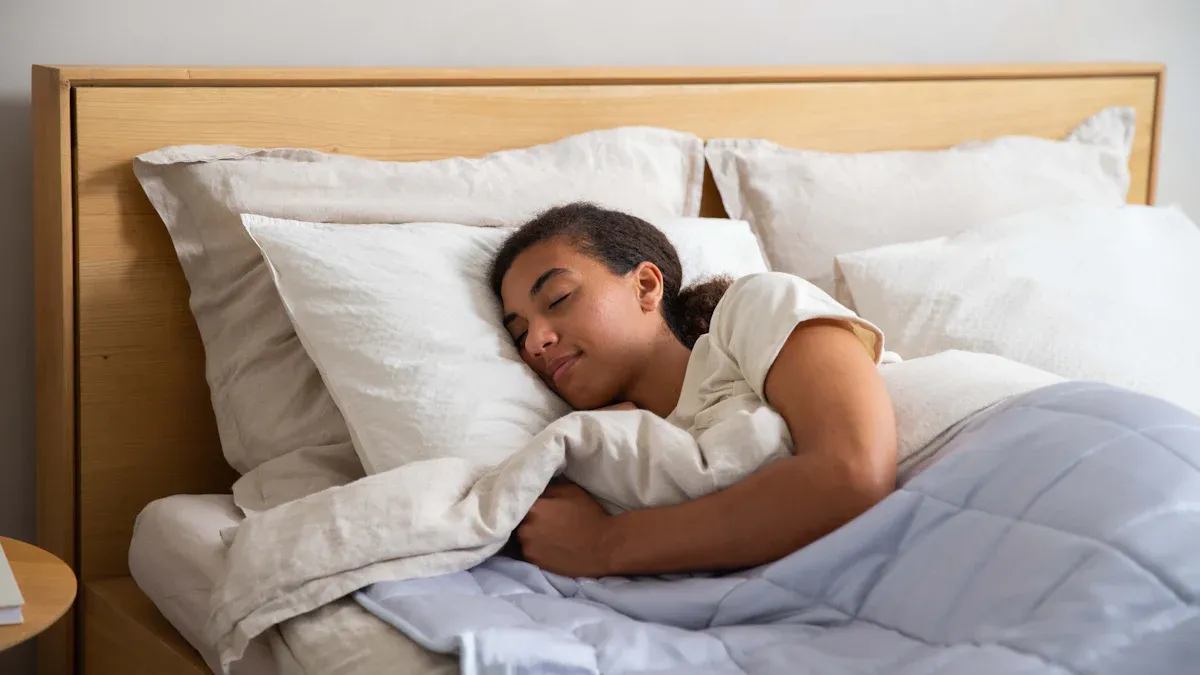
You want to sleep better, but it can feel tough to know where to start. Simple sleep habits can make a real difference. Studies with thousands of teens show that when you keep a regular sleep schedule, you lower your risk for mood swings, stress, and even health problems like obesity. Many teens struggle with poor sleep quality, and over 80% report restless nights.
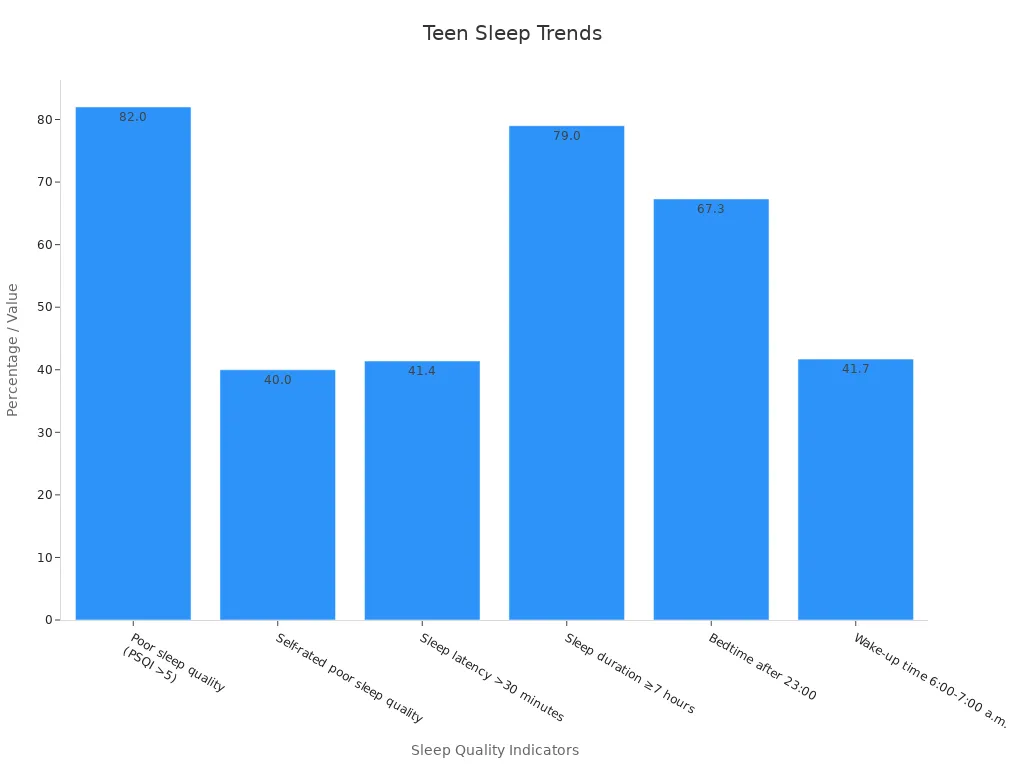
Small changes, like following a few sleep tips or trying new advice, can help you rest well. If you want to know How To Get Better Sleep, you’re in the right place.
Key Takeaways
-
Go to bed and wake up at the same time every day. This helps your body rest well and feel awake during the day.
-
Do relaxing things before bed without using screens. This helps your mind calm down and lets you fall asleep faster.
-
Keep your bedroom cool, dark, and quiet. This makes you more comfortable and helps you sleep deeply.
-
Do not use screens before bed and keep devices out of your room. Blue light and distractions from devices can make it hard to sleep.
-
Try simple ways to handle stress like deep breathing, writing in a journal, or mindfulness. These habits help your mind relax and make your sleep better.
Why Good Sleep Matters
Health and Mood
You might not realize it, but good sleep does more than just help you feel rested. It plays a huge role in your health and mood every day. When you get enough sleep, your body repairs itself, your mind feels clear, and your emotions stay balanced. Missing out on good sleep can make you feel cranky, stressed, or even sad. Over time, poor sleep can lead to bigger health problems, like heart disease or diabetes.
Did you know? During sleep, your body lowers blood pressure and heart rate, which helps your heart stay healthy. Sleep also helps your body fight off sickness and keeps your hormones in check.
Here’s what happens when you make sleep a priority:
-
Your brain works better, so you can think clearly and remember things.
-
Your mood improves, and you feel less grouchy or anxious.
-
Your body repairs muscles and tissues, helping you grow and stay strong.
-
You lower your risk for serious health issues, like high blood pressure and obesity.
Check out this table showing how sleep and mood connect:
|
Aspect |
What Happens |
Why It Matters |
|---|---|---|
|
Sleep quality |
Better sleep leads to better mood and less grouchiness |
You feel happier and more positive |
|
Mood |
Feeling sad or stressed can make sleep worse |
It’s a cycle—bad mood hurts sleep, and bad sleep hurts mood |
|
Health |
Good sleep lowers risk for heart problems and sickness |
You stay healthier and miss fewer days at school or work |
Daily Performance
Getting the best sleep helps you do your best every day. When you wake up refreshed, you can focus better in class or at work. You make fewer mistakes and finish tasks faster. If you don’t get enough sleep, you might find yourself forgetting things or putting off important work.
-
People who sleep well are more likely to stay on top of their homework and job tasks.
-
Good sleep helps you avoid procrastination and keeps your energy up.
-
Studies show that even one extra hour of sleep can make you more alert and ready to learn.
You can see how good sleep supports your health, mood, and daily life. Making sleep a priority is one of the best things you can do for yourself.
How to Get Better Sleep
Regular Sleep Schedule
If you want to know how to get better sleep, start by setting a regular sleep schedule. Try to go to bed and wake up at the same time every day—even on weekends. This simple habit helps your body know when it’s time to rest and when it’s time to get moving. When you create a routine, your brain and body work together to improve your sleep.
Many studies show that sticking to a regular sleep schedule leads to good sleep and better health. Here’s what researchers have found:
-
People who keep a consistent sleep schedule feel more rested and alert during the day.
-
Irregular bedtimes can make you feel tired, cranky, and less focused.
-
Social jetlag, which happens when you sleep late on weekends, can hurt your mood and health.
-
Weekend catch-up sleep may help a little, but it’s not as good as a steady routine.
A good sleep routine means you go to bed at the same time each night and wake up at the same time each morning. This helps you fall asleep faster and wake up feeling refreshed. If you want to improve your sleep, try setting an alarm for both bedtime and wake-up time.
Tip: Write down your bedtime and wake-up goals. Hang them where you can see them every day.
Avoid Sleeping In
It might feel nice to sleep in, especially after a long week. But sleeping in can actually make it harder to sleep better at night. For teens, sleeping late or taking long naps can mess up your good sleep routine. You may find it harder to fall asleep the next night, which can lead to a cycle of poor rest.
To improve sleep, keep your wake-up time steady—even on weekends. If you feel tired, try a short nap (20–30 minutes) instead of sleeping for hours. This keeps your routine on track and helps you improve your sleep quality.
If you want to know how to get better sleep, remember: a regular sleep schedule and a good sleep routine are your best friends. These simple tips can help you improve your sleep, boost your mood, and feel your best every day.
Bedtime Routine
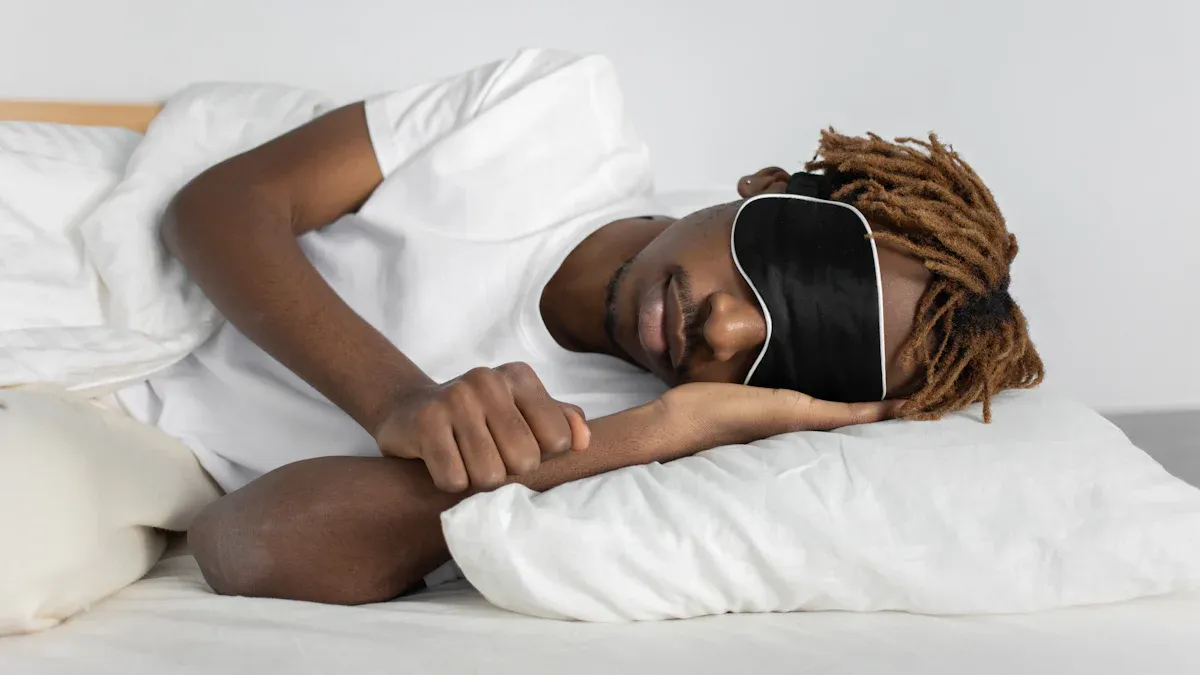
A good bedtime routine can make it much easier for you to fall asleep and stay asleep. When you do the same relaxing things each night, your body learns that it’s time to wind down. This helps you get better sleep and feel more rested in the morning.
Relaxing Activities
You don’t need anything fancy to create a calming bedtime routine. Just find things to help you relax and make them a regular part of your evening. Here are some ideas:
-
Read a book or listen to soft music.
-
Try journaling about your day or writing down what you’re grateful for.
-
Practice slow, deep breathing or gentle stretches.
-
Meditate for a few minutes or use a guided relaxation app.
Tip: Slow breathing before bed can help you fall asleep faster and improve your sleep quality. Even a short session can make a difference if you struggle to relax at night.
Research shows that people who follow a bedtime routine at least five nights a week fall asleep quicker, wake up less during the night, and get longer, better sleep. Simple activities like reading or taking a warm shower can also boost your mood and help your mind settle down.
What to Avoid
Some things can make it harder for you to relax and fall asleep. Try to skip these activities before bed:
-
Playing video games or watching exciting shows
-
Using your phone, tablet, or computer
-
Doing homework or anything stressful
Using screens before bed can keep your brain active and make it harder to fall asleep. The blue light from devices can also mess with your body’s natural sleep signals. Studies show that even 15 minutes of screen time at bedtime can double your risk of poor sleep quality. If you want to sleep well, keep your bedroom a screen-free zone and save those activities for earlier in the day.
A relaxing bedtime routine helps your body and mind know it’s time to rest. Stick with it, and you’ll notice how much easier it is to fall asleep and wake up feeling refreshed.
Sleep Environment
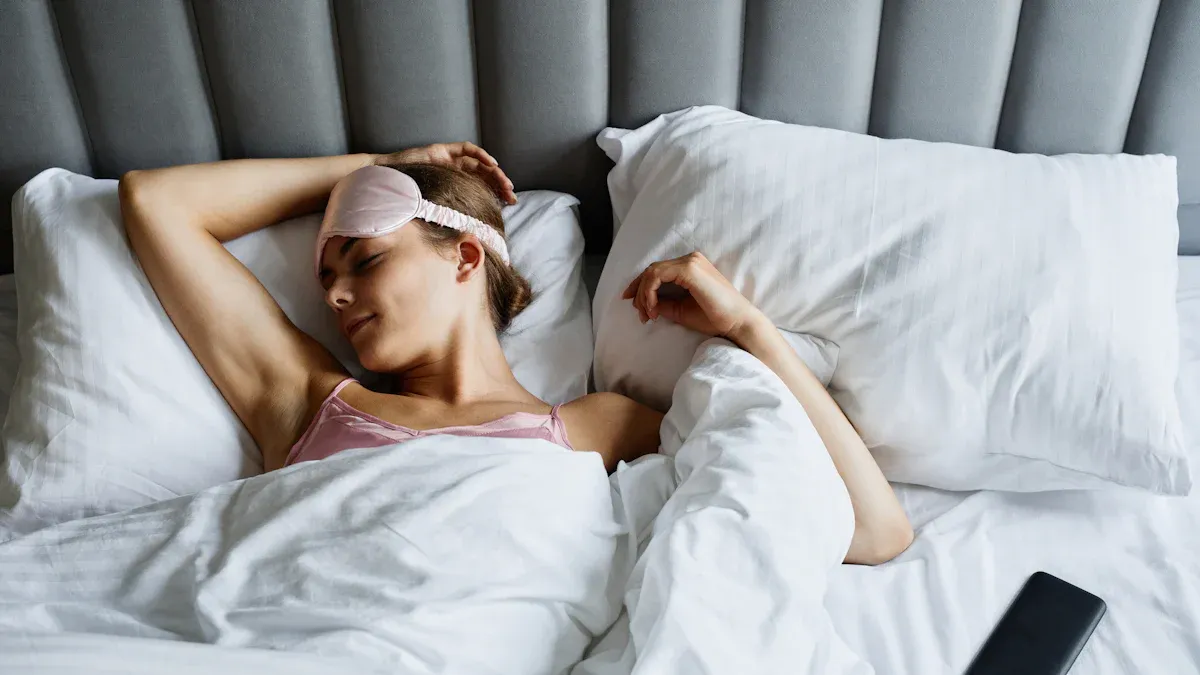
Comfort and Darkness
Your bedroom can make a big difference in how well you sleep. If you want to improve your sleep, focus on comfort and darkness. A cool, dark, and quiet room helps your body relax and signals that it’s time for rest. Studies from Shanghai and other places show that high temperatures, humidity, and noise can lower your sleep quality. When your room is too warm or stuffy, you might wake up more often and get less deep sleep. Using air conditioning or a fan can help keep your room cool and comfortable. Good air quality and low noise levels also support better sleep hygiene.
A review of sleep hygiene research suggests that the best bedroom temperature is between 17 and 28 °C. Keeping your room dark is just as important. Light, especially blue light, can confuse your body’s clock and make it harder to fall asleep. Try blackout curtains or an eye mask if you notice light sneaking in at night.
Here’s a quick look at how comfort and darkness affect your sleep hygiene:
|
Sleep Environment Variable |
Odds Ratio (OR) |
95% Confidence Interval (CI) |
What It Means |
|---|---|---|---|
|
Pillow comfort (uncomfortable) |
2.00 |
1.27 – 3.17 |
Twice the odds of insomnia compared to very comfortable pillows |
|
Nocturnal bedroom noise (loud) |
2.20 |
1.26 – 3.82 |
More than double the odds of insomnia compared to completely quiet bedrooms |
|
Bedroom brightness at night |
0.88 |
0.48 – 1.62 |
No strong link to insomnia in this study |
If you want to improve your sleep hygiene, start by making your bedroom as comfortable and dark as possible.
Remove Distractions
Distractions in your bedroom can hurt your sleep hygiene. If you want to improve your sleep, keep your room free from things that might wake you up or keep your mind busy. Here are some tips:
-
Remove electronics like TVs, computers, and phones from your bedroom.
-
Keep your bed for sleep only, not for homework or watching videos.
-
Use blackout curtains or a white noise machine to block out light and sound.
-
Choose a mattress and pillow that feel good to you.
Research shows that when you remove distractions, you improve your sleep efficiency and get better rest. The National Sleep Foundation recommends blackout curtains, white noise, and a comfy mattress for good sleep hygiene. Reducing screen time before bed also helps your body get ready for sleep.
Tip: If you wake up during the night, avoid checking your phone. This small change can really improve your sleep hygiene.
A clean, quiet, and comfortable bedroom is one of the best ways to improve your sleep. Try making a few changes tonight and see how much better you feel in the morning.
Screen Time and Electronics
Limit Before Bed
You might love scrolling through your phone or watching videos before bed, but screens can make it harder for you to fall asleep. The blue light from phones, tablets, and computers tells your brain to stay awake. This light stops your body from making melatonin, the hormone that helps you feel sleepy. When you use screens late at night, you may find it tough to relax and drift off.
Turning off screens at least one hour before bed can help your body get ready for sleep. Studies show that blocking blue light in the evening helps teens fall asleep faster and feel better during the day. In one study, teens who cut down on screen time after 9 p.m. went to bed earlier and slept longer. Even just ten minutes of social media before bed can take away seven minutes of sleep. Using your phone before bed can cut your sleep by more than half an hour!
Here’s a quick look at how screen time affects your sleep:
|
Sleep Parameter |
Low Screen Time (<1 hr/day) |
High Screen Time (>3 hrs/day) |
|---|---|---|
|
Sleep Efficiency |
90% |
75% |
|
Night Wakings (per week) |
0.5 |
1.5 |
|
Daytime Sleepiness (%) |
20% |
60% |
|
Dream Recall Frequency (%) |
70% |
30% |
|
Weekend Sleep Variability |
0.8 hours |
1.2 hours |
|
Circadian Rhythm Disruption Risk |
Lower |
20% higher risk |
Tip: Try reading a book or listening to calming music instead of using your phone before bed.
No Devices in Bedroom
Keeping electronics out of your bedroom can make a big difference in how well you sleep. When you charge your devices outside your room, you remove the temptation to check them at night. This helps your mind relax and makes it easier to fall asleep and stay asleep.
Kids and teens who keep devices in their bedrooms are more likely to have poor sleep and feel tired during the day. Take a look at this chart to see how device use in the bedroom affects sleep quality:
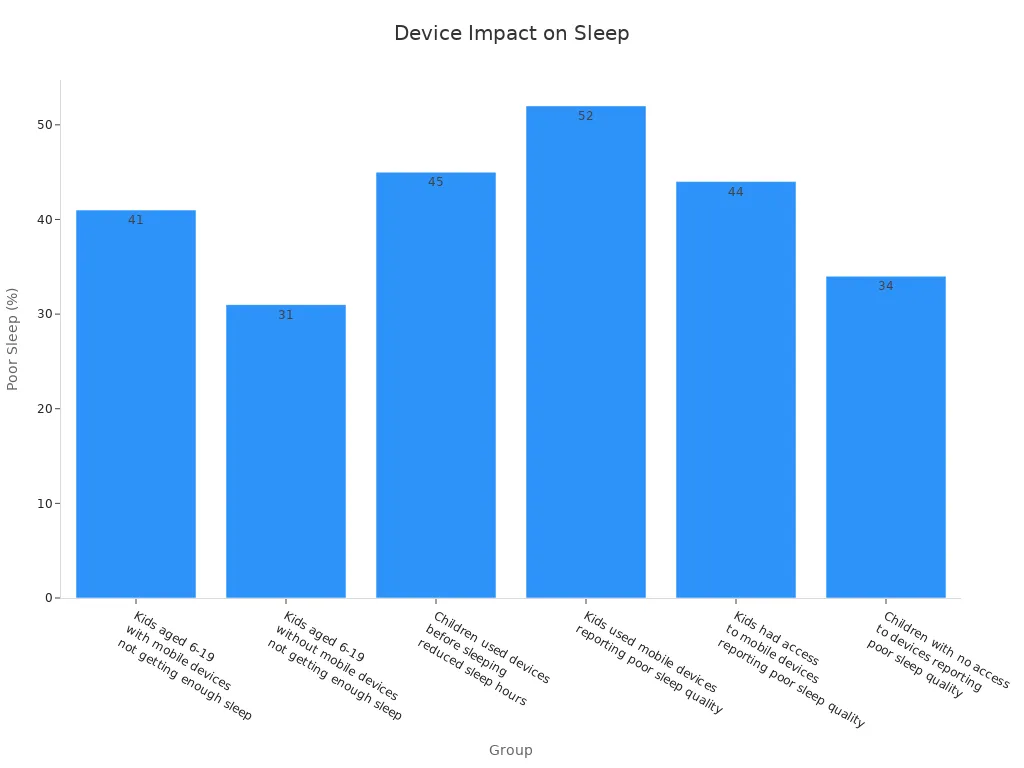
Here are some reasons why keeping devices out of your bedroom helps:
-
Devices can wake you up with sounds or lights.
-
You might feel tempted to check messages or play games late at night.
-
Blue light from screens can mess with your body’s natural sleep rhythm.
If you want better sleep, try charging your phone in another room. Make your bedroom a calm, screen-free space. You’ll wake up feeling more rested and ready for the day.
Food, Drink, and Caffeine
Evening Choices
What you eat and drink in the evening can make a big difference in how well you sleep. If you eat a heavy or spicy meal right before bed, your body has to work hard to digest it. This can lead to heartburn or an upset stomach, which might wake you up during the night. A large study found that eating or drinking less than an hour before bedtime can disturb your sleep and make it harder to stay asleep. The best time for your last meal or snack is about 4 to 6 hours before you go to bed.
You don’t have to go to bed hungry. If you want a snack, choose something light and easy to digest. Here are some good options:
-
A small bowl of oatmeal
-
A banana or apple slices
-
A handful of nuts
-
Low-fat yogurt
Tip: Try to avoid sugary snacks or drinks in the evening. They can give you a burst of energy when you want to wind down.
Caffeine Limits
Caffeine hides in more than just coffee. You’ll find it in tea, soda, chocolate, and even some pain relievers. Caffeine keeps you awake by blocking a chemical in your brain that helps you feel sleepy. If you drink caffeine in the late afternoon or evening, it can stay in your body for hours and make it hard to fall asleep.
Research shows that drinking caffeine even six hours before bedtime can cut your sleep by almost an hour. It also makes it harder to get deep, restful sleep. One study found that every extra milligram of caffeine you have during the day can make your sleep quality a little worse. Soda with caffeine seems to have an even bigger effect.
Here’s a quick table to help you spot hidden caffeine:
|
Drink or Food |
Caffeine (mg) |
|---|---|
|
Coffee (8 oz) |
80-100 |
|
Black tea (8 oz) |
40-70 |
|
Cola (12 oz) |
30-40 |
|
Chocolate bar |
10-30 |
If you want better sleep, try to avoid caffeine at least six hours before bedtime. Choose water, herbal tea, or warm milk instead. Your body and mind will thank you in the morning!
Exercise and Sunlight
Daytime Activity
Getting regular exercise during the day can help you sleep better at night. When you move your body, you use up energy and help your mind relax. Experts say that even a short walk or a bike ride can make a big difference. Exercise helps your body release endorphins, which boost your mood and lower stress. This is great for your health and makes it easier to fall asleep.
Stanford researchers say that sunlight is one of the most important things for your body clock. Try to get at least 30 minutes of sunlight during the day. Morning sunlight is best because it helps set your internal clock and tells your body when to wake up and when to sleep. If you spend time outside in the afternoon, it can make your sleep even better. A study with athletes found that more sunlight during the day led to better sleep and more regular sleep patterns.
Tip: Open your curtains as soon as you wake up or take a quick walk outside before school or work. Sunlight in the morning helps your body know it’s time to start the day.
Best Times
The timing of your exercise matters for good sleep. Try to finish your workout at least 2-3 hours before bedtime. This gives your body time to cool down and relax. Morning or early afternoon exercise works best for most people. It helps you fall asleep faster and improves your sleep quality.
Here’s a quick guide to help you plan:
|
Time of Exercise |
Effect on Sleep |
|---|---|
|
Morning |
Helps you fall asleep faster |
|
Afternoon |
Supports deep, restful sleep |
|
Evening (late) |
May make it harder to sleep |
If you want to do something active in the evening, choose gentle activities like yoga or stretching. Avoid hard workouts close to bedtime because they can keep you awake. Everyone is different, so pay attention to how your body feels after exercise.
Regular exercise and sunlight are simple ways to boost your health and improve your sleep. Try adding a little more movement and outdoor time to your day, and see how much better you feel.
Manage Stress for Good Sleep
Stress-Relief Tips
You might notice that when you feel stressed, you have more trouble sleeping. Your mind races, and you just can’t seem to get back to sleep. The good news? Simple stress-relief tips can help you relax and rest better. Many people find that building resilience—your ability to bounce back from tough times—makes it easier to fall asleep and wake up refreshed. Studies show that when you manage stress well, you sleep better and feel less tired during the day.
Try these easy tips to calm your mind before bed:
-
Practice deep breathing. Slow, steady breaths can help your body relax. Try box breathing or slow belly breathing for at least five minutes.
-
Spend time with a pet. Petting a dog or cat can lower your stress and help you get back to sleep if you wake up at night.
-
If you can’t get back to sleep after 15 minutes, leave your bed. Do something quiet and relaxing, like reading or listening to soft music, until you feel sleepy again.
Tip: Deep breathing works best when you sit or lie down in a comfy spot and keep your practice free from distractions.
Journaling and Mindfulness
Journaling is another great way to handle stress and improve your sleep. Write down your thoughts or worries before bed. This helps clear your mind and makes it easier to drift off. If you wake up and have trouble sleeping, jotting down what’s on your mind can help you get back to sleep faster.
Mindfulness is also a powerful tool. When you practice mindfulness, you focus on the present moment and let go of worries about the past or future. Research shows that mindfulness can help you sleep better and feel less tired during the day. In one study, people who practiced mindfulness had better sleep quality and felt more rested.
Here’s a quick look at how mindfulness compares to other sleep treatments:
|
Comparison Group |
Strength of Evidence |
Effect on Sleep Quality (Effect Size, 95% CI) |
Interpretation |
|---|---|---|---|
|
Specific Active Controls |
Low |
Posttreatment: 0.03 (-0.43 to 0.49) |
No big difference compared to other sleep treatments |
|
Nonspecific Active Controls |
Moderate |
Postintervention: 0.33 (0.17 to 0.48) |
Mindfulness helps more than basic tips |
|
|
|
Follow-up: 0.54 (0.24 to 0.84) |
Benefits last over time |
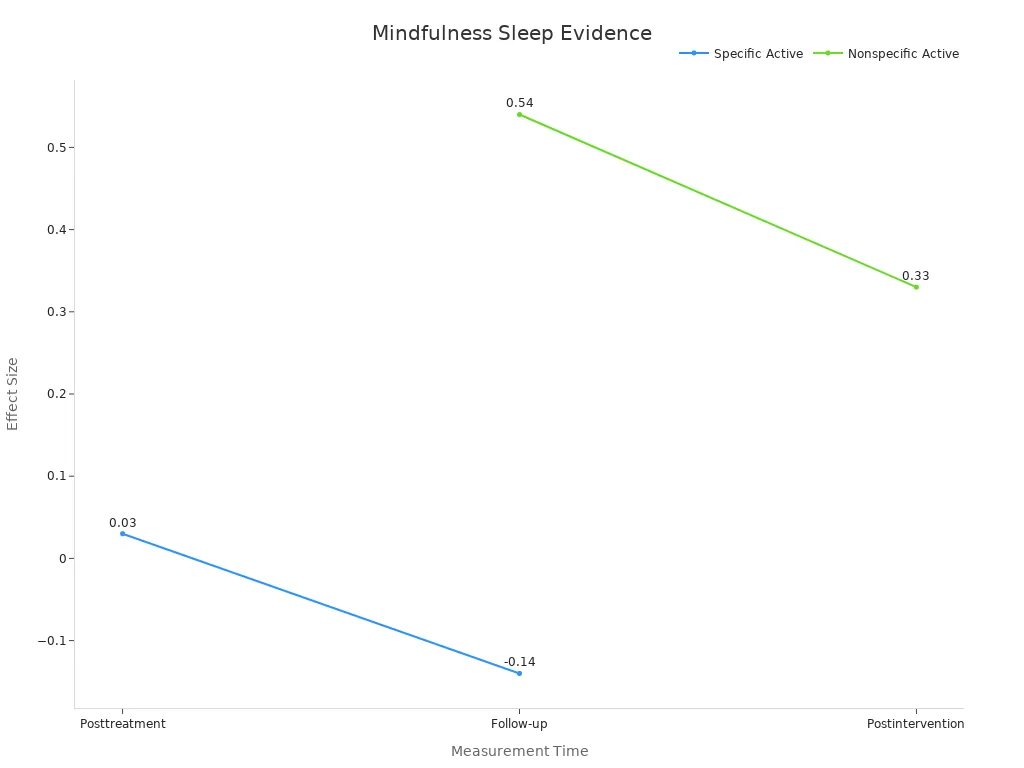
If you wake up and can’t get back to sleep, try a few minutes of mindful breathing or write in your journal. These small habits can make a big difference in how well you sleep and how you handle stress.
Sleep Tips for Ongoing Problems
When to Seek Help
Sometimes, no matter what you try, you still struggle with insomnia. You might find yourself lying awake for hours or waking up many times during the night. If this happens often, it could be a sign of a bigger problem. You should know when it’s time to talk to a doctor or sleep specialist.
Here are some signs that mean you might need help:
-
You have trouble falling asleep or staying asleep most nights.
-
You feel tired, cranky, or have trouble focusing during the day.
-
Your sleep problems last for weeks or months.
-
You notice your mood getting worse, or you feel sad or anxious more often.
-
You use sleep medications but still feel tired.
Only about half of people with insomnia ask for help, even though it can really affect your life. Many people with insomnia also have other health issues, like depression or anxiety. If you notice these signs, don’t wait—reach out to a healthcare provider. You deserve to feel rested and healthy.
Melatonin and Other Options
You might hear about melatonin as a way to help with insomnia, especially for teens. Melatonin is a hormone your body makes to help control your sleep cycle. Some people take melatonin supplements to fall asleep faster. Research shows that melatonin is not linked to serious side effects in kids and teens, but it can cause mild problems like headaches or feeling sleepy during the day. Some studies suggest that using melatonin for many years could affect puberty, but the results are mixed and not clear.
Many families think melatonin is safe because it’s natural, but the amount in each pill can be different. Some products have more or less melatonin than the label says. Doctors recommend using melatonin only for a short time and always with medical advice. If you want to try melatonin, talk to your doctor first. They can help you decide if it’s right for you and make sure you use it safely.
Remember, healthy sleep habits work best for most people. Medicine or supplements should not be your first step. If you keep having insomnia, a doctor can help you find the safest and most effective treatment.
You have many ways to improve your sleep. Try a few simple changes, like keeping your room dark or following a bedtime routine. The table below shows how small steps can boost your sleep quality:
|
Sleep Domain |
Median Difference |
Notes |
|---|---|---|
|
Depth of Sleep |
5 |
Slightly better with new habits |
|
Falling Asleep |
5 |
Highest scores with good routines |
|
Awakenings |
11 |
Fewer wake-ups at night |
|
Sleep General Quality |
11.5 |
Better overall rest |
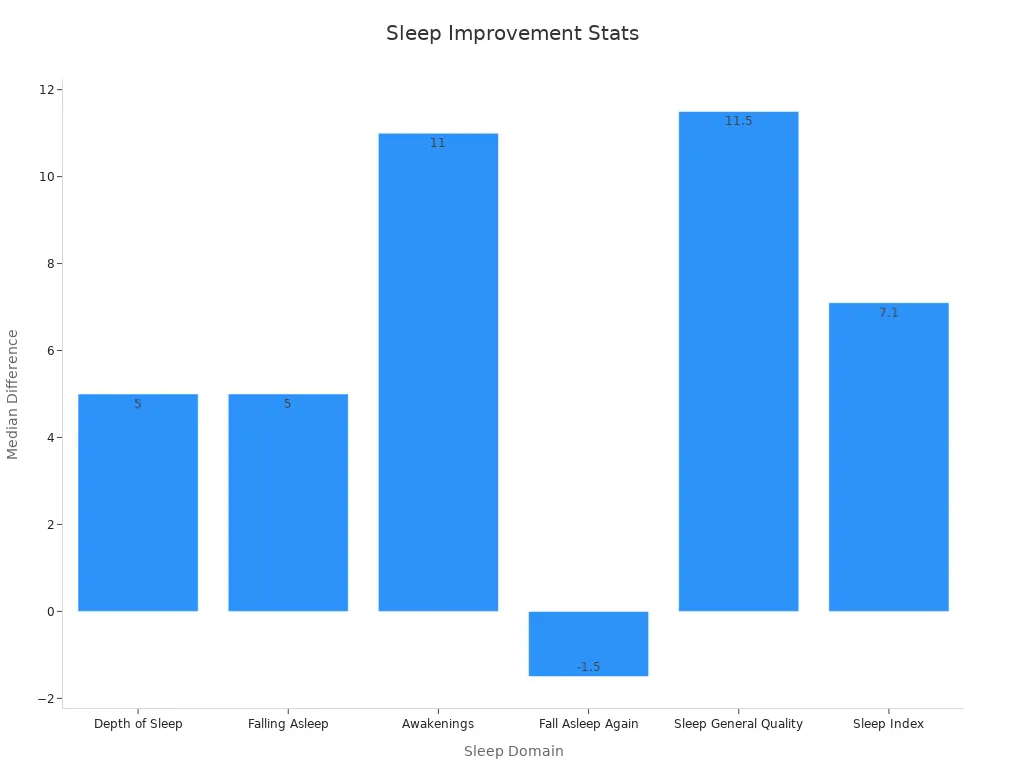
Start with one piece of advice and stick with it. Consistency helps you see real results. You can build better sleep, one step at a time. You’ve got this!
FAQ
How long should you sleep each night?
Most teens need 8–10 hours. Adults usually need 7–9 hours. You might feel best with a little more or less. Listen to your body and notice how you feel during the day.
Can you catch up on sleep during weekends?
Sleeping in on weekends feels good, but it can confuse your body clock. Try to keep your wake-up time close to your weekday schedule. Short naps work better than long sleep-ins.
What if you wake up in the middle of the night?
If you can’t fall back asleep after 15 minutes, get up. Do something quiet, like reading or listening to soft music. Go back to bed when you feel sleepy again.
Is it okay to use your phone as an alarm clock?
You can, but it’s better to keep your phone outside your bedroom. Use a simple alarm clock instead. This helps you avoid late-night scrolling and sleep distractions.
Do sleep habits really help with stress?
Yes! Good sleep habits help your mind and body handle stress. You feel calmer and think more clearly. Try deep breathing or journaling before bed to relax.








